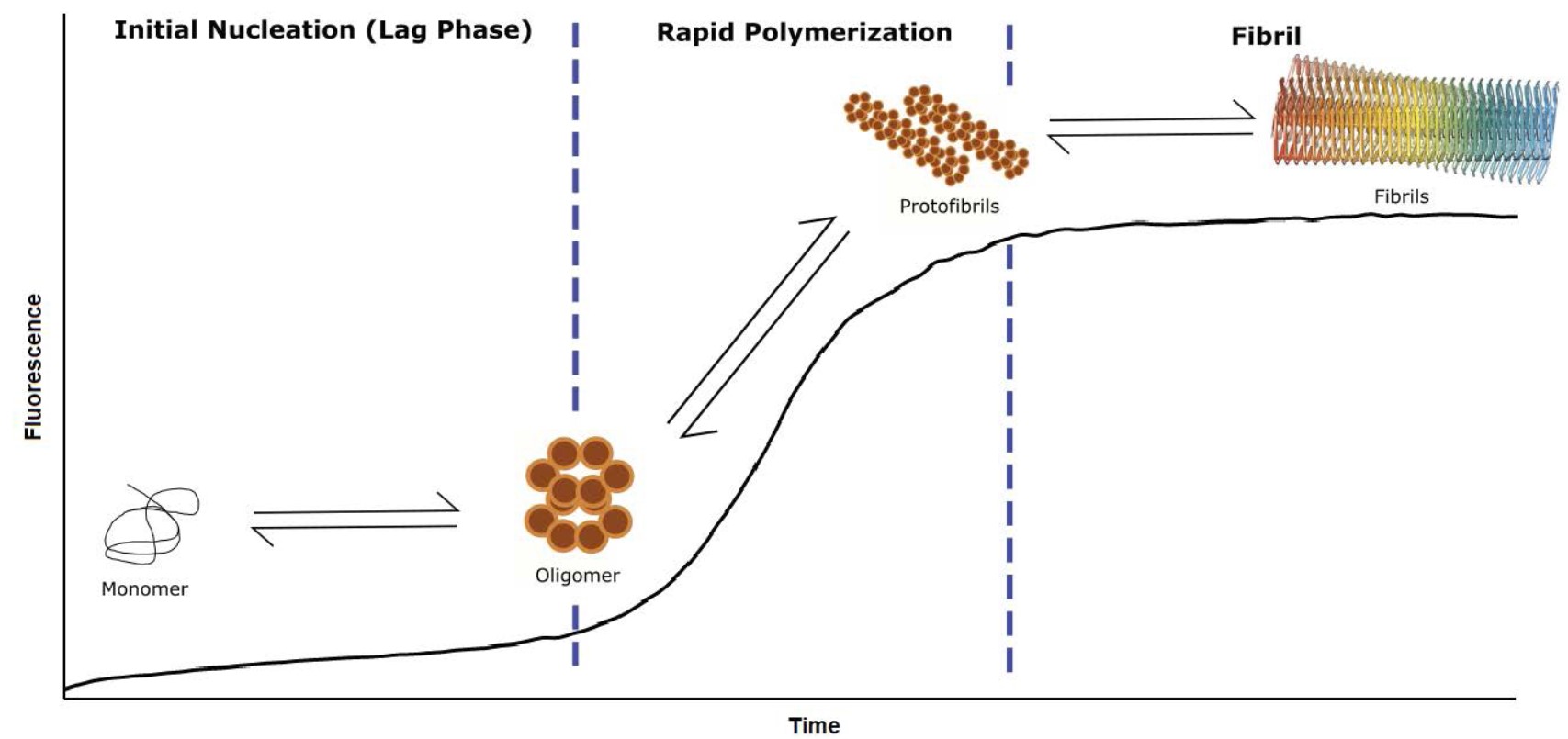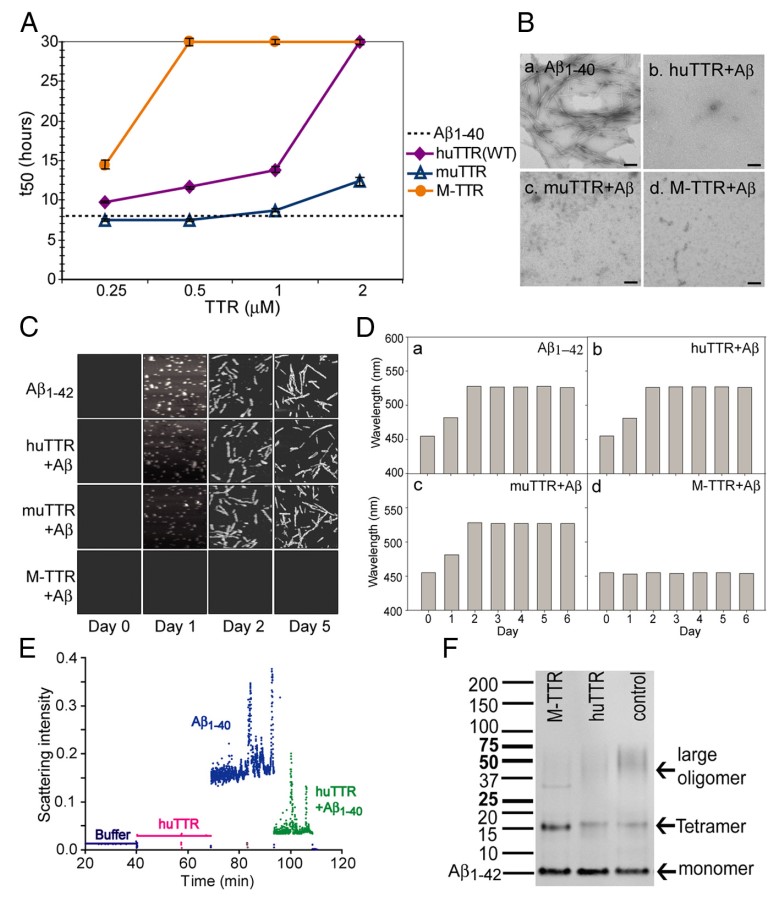Aβ Peptide Aggregation Inhibition Assay
The formation of amyloid β (Aβ) aggregates is one of the major hallmarks of Alzheimer's disease (AD), which is associated with the progressive cognitive decline in AD patients. To inhibit or interfere Aβ aggregation are thought to be potential effective managing the progression of AD. Therefore, compounds that are developed to disrupt Aβ aggregation should be in high demand.
 Figure 1 Schematic of amyloid formation from monomer, heterogeneous oligomers / protofbrils, to mature fbrils.
Figure 1 Schematic of amyloid formation from monomer, heterogeneous oligomers / protofbrils, to mature fbrils.
Creative Bioarray offers customized in vitro models for Aβ peptide aggregation inhibition assay, including primary neuronal cultures, cell lines, iPS cells with genetic modifications, which are phenotypically closer to those observed in the aged neuronal network and mimic the development of AD. Using these in vitro models, the direct effects of reducing Aβ aggregate formation by compounds will be carefully evaluated.
We provide this powerful and versatile tool for developing potential AD therapy directly as well as basic research to help our customers who wish to understand more about the underlying mechanisms of AD from which they could facilitate the process of drug development.
Study Examples
 Figure 2 Transthyretin (TTRs) inhibit Aβ oligomer and fibril formation.
Figure 2 Transthyretin (TTRs) inhibit Aβ oligomer and fibril formation.
Quotation and ordering
Contact us if you have any questions. Our customer service representatives are available 24hr a day.
References
- Bi TM.; et al. The role of alpha-sheet in amyloid oligomer aggregation and toxicity. Yale J Biol Med. 2018, 91(3): 247-255.
- Li X.; et al. Mechanisms of transthyretin inhibition of β -amyloid aggregation in vitro. J Neurosci. 2013, 33(50): 19423-1933.
For research use only. Not for any other purpose.
Disease Models
- Oncology Models
-
Inflammation & Autoimmune Disease Models
- Rheumatoid Arthritis Models
- Glomerulonephritis Models
- Multiple Sclerosis (MS) Models
- Ocular Inflammation Models
- Sjögren's Syndrome Model
- LPS-induced Acute Lung Injury Model
- Peritonitis Models
- Passive Cutaneous Anaphylaxis Model
- Delayed-Type Hypersensitivity (DTH) Models
- Inflammatory Bowel Disease Models
- Systemic Lupus Erythematosus Animal Models
- Oral Mucositis Model
- Asthma Model
- Sepsis Model
- Psoriasis Model
- Atopic Dermatitis (AD) Model
- Scleroderma Model
- Gouty Arthritis Model
- Carrageenan-Induced Air Pouch Synovitis Model
- Carrageenan-Induced Paw Edema Model
- Experimental Autoimmune Myasthenia Gravis (EAMG) Model
- Graft-versus-host Disease (GvHD) Models
-
Cardiovascular Disease Models
- Surgical Models
- Animal Models of Hypertension
- Venous Thrombosis Model
- Atherosclerosis model
- Cardiac Arrhythmia Model
- Hyperlipoidemia Model
- Doxorubicin-induced Heart Failure Model
- Isoproterenol-induced Heart Failure Model
- Arterial Thrombosis Model
- Pulmonary Arterial Hypertension (PAH) Models
- Heart Failure with Preserved Ejection Fraction (HFpEF) Model
- Cardio-Renal-Metabolic (CKM) Syndrome Model
-
Neurological Disease Models
- Alzheimer's Disease Modeling and Assays
- Seizure Models
- Parkinson's Disease Models
- Ischemic Stroke Models
- Acute Spinal Cord Injury (ASCI) Model
- Traumatic Brain Injury (TBI) Model
- Hypoxic-Ischemic Encephalopathy (HIE) Model
- Tourette Syndrome (TS) Model
- Amyotrophic Lateral Sclerosis (ALS) Model
- Huntington's Disease (HD) Model
- Intracerebral hemorrhage (ICH) Models
- Schizophrenia Model
- Depression Models
- Pain Models
-
Metabolic Disease Models
- Type 1 Diabetes Mellitus Model
- Type 2 Diabetes Mellitus Model
- Animal Model of Hyperuricemia
-
Nonalcoholic Fatty Liver Disease Model
- High-Fat Diet-Induced Nonalcoholic Fatty Liver Disease (NAFLD) Model
- Methionine and Choline Deficient (MCD) Diet-Induced Nonalcoholic Fatty Liver Disease (NAFLD) Model
- Gubra-Amylin NASH (GAN) Diet-Induced Nonalcoholic Fatty Liver Disease (NAFLD) Model
- Streptozotocin (STZ) Induced Nonalcoholic Fatty Liver Disease (NAFLD) Model
- High Fat Diet-Induced Obesity Model
- Diabetic Foot Ulcer (DFU) Model
- Cardio-Renal-Metabolic (CKM) Syndrome Model
- Liver Disease Models
- Rare Disease Models
- Respiratory Disease Models
- Digestive Disease Models
-
Urology Disease Models
- Cisplatin-induced Nephrotoxicity Model
- Unilateral Ureteral Obstruction Model
- 5/6 Nephrectomy Model
- Renal Ischemia-Reperfusion Injury (RIRI) Model
- Diabetic Nephropathy (DN) Models
- Passive Heymann Nephritis (PHN) Model
- Adenine-Induced Chronic Kidney Disease (CKD) Model
- Kidney Stone Model
- Doxorubicin-Induced Nephropathy Model
- Orthotopic Kidney Transplantation Model
- Benign Prostatic Hyperplasia (BPH) Model
- Peritoneal Fibrosis Model
- Cardio-Renal-Metabolic (CKM) Syndrome Model
- Orthopedic Disease Models
- Ocular Disease Models
- Skin Disease Models
- Infectious Disease Models
- Otology Disease Models